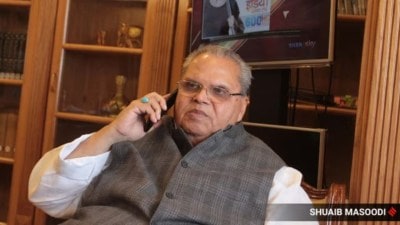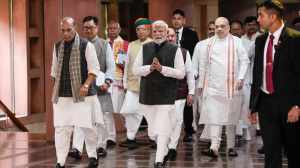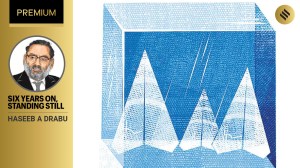40 STPs, extension of sewer lines: DJB’s Rs 3,104-cr proposal to clean Yamuna
The proposal, discussed in a recent meeting of the Finance Department’s Expenditure Finance Committee (EFC), is aimed at covering 416 unauthorised colonies and 115 villages across seven Assembly constituencies, benefitting approximately 35 lakh residents.
 The project is being funded under the Centre’s Atal Mission for Rejuvenation and Urban Transformation (AMRUT) 2.0 scheme. It proposes a three-month planning period followed by 18 months of execution, excluding monsoon delays. For 2025-26, an amount of Rs 613.4 crore has been earmarked.
The project is being funded under the Centre’s Atal Mission for Rejuvenation and Urban Transformation (AMRUT) 2.0 scheme. It proposes a three-month planning period followed by 18 months of execution, excluding monsoon delays. For 2025-26, an amount of Rs 613.4 crore has been earmarked.
In a push to curb the flow of untreated sewage into the Yamuna River, the Delhi Jal Board (DJB) has proposed the construction of 40 decentralised sewage treatment plants (DSTPs) and extension of sewer lines in Outer Delhi at an estimated cost of Rs 3,104.57 crore.
The proposal, discussed in a recent meeting of the Finance Department’s Expenditure Finance Committee (EFC), is aimed at covering 416 unauthorised colonies and 115 villages across seven Assembly constituencies, benefitting approximately 35 lakh residents.
As per the communication shared by the DJB’s Chief Engineer (Nodal)-Drainage to the EFC on May 2, the DJB outlined a comprehensive plan to provide sewer coverage to around 35 lakh residents in areas including Najafgarh, Chhatarpur, Matiala, Bijwasan, Mundka, Narela, and Bawana constituencies. At present, untreated sewage from these localities flows directly into open drains and eventually into Yamuna.
“Currently, sewage from unauthorised colonies and villages is polluting Yamuna and causing unhygienic conditions in the streets,” the DJB said. “After installation of the sewerage system, sewage will be diverted into the DJB network, improving sanitary conditions and significantly reducing pollution levels,” it added.
The project is being funded under the Centre’s Atal Mission for Rejuvenation and Urban Transformation (AMRUT) 2.0 scheme. It proposes a three-month planning period followed by 18 months of execution, excluding monsoon delays. For 2025-26, an amount of Rs 613.4 crore has been earmarked.
The proposal also includes the construction of a 10 MGD (million gallons per day) sewage treatment plant (STP) at Delhi Gate Phase-III, and DSTPs at key locations such as Bijwasan, Ghewara (Mundka), Tajpur Khurd (Najafgarh), Garhi Rindhala, Jaunti, Bajitpur Thakran, Salahpur Majra, Sungerpur (Narela), Fatehpurberi Majra, and Chandan Hola (Chhattarpur).
In the minutes of the meeting, it was emphasised that “the timeline is the essence of a project”. The EFC directed DJB to include “stringent penalty clauses in the tender documents to assure high-quality construction and adherence to the stipulated timeline.” A Project Management Consultant (PMC) will be appointed, and the Urban Development Department has been instructed to establish a dedicated Project Management Unit (PMU) for oversight.
House sewer connections will be provided directly from DJB manholes to individual households in parts of the Najafgarh and Matiala constituencies, including areas like Hasanpur, Galibpur, Khera Dabar, and Jafarpur. Sewer lines will also be laid in several Mundka villages. The EFC has recommended placing the proposal before the Council of Ministers for final approval, along with a detailed project report (DPR), comprehensive action plan, and financial roadmap.
Meanwhile, the DJB is simultaneously working on upgrading existing infrastructure. Delhi currently operates 38 STPs across 20 locations, with a total treatment capacity of 712 MGD against an estimated sewage generation of 792 MGD. By December 2026, the capacity is expected to rise to 814.06 MGD through upgradation of 14 STPs and construction of three new plants at Sonia Vihar, Delhi Gate, and Okhla, which are expected to add 47 MGD..
Delhi Water Minister Parvesh Sahib Singh has recently ordered a third-party audit of all 37 STPs.












